Is Chaplaincy Considered a Ministry or a Profession?


The role of chaplaincy has long stood at the intersection of religious ministry and professional service. As institutions like hospitals, military establishments, prisons, and educational organizations increasingly recognize the importance of spiritual and emotional care, the question arises: Is chaplaincy primarily a ministry rooted in religious calling, or a recognized profession with standardized qualifications? This article explores the multifaceted nature of chaplaincy, examining its classifications, qualifications, roles, and how it is perceived within various institutional and governmental frameworks.
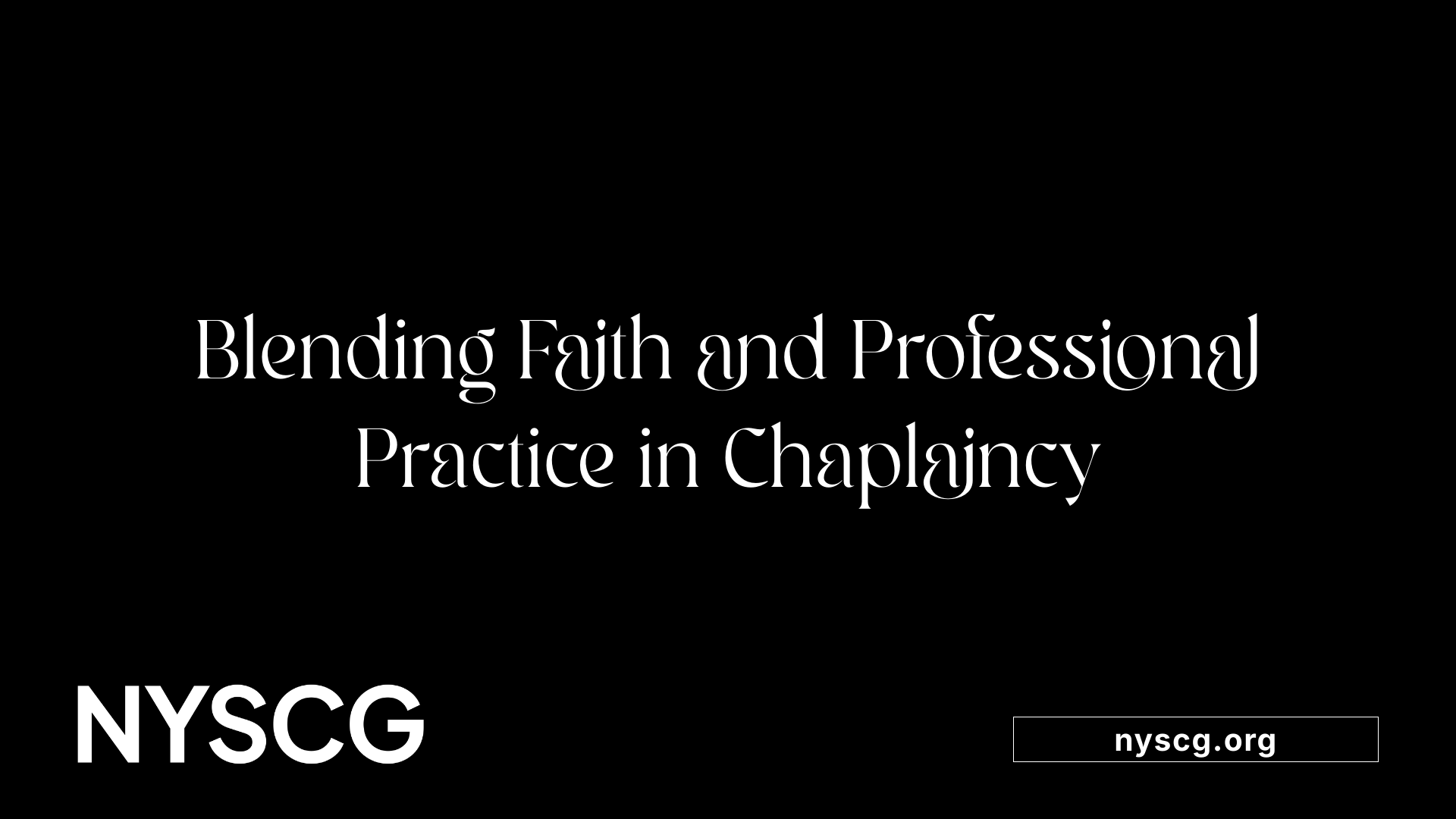
Chaplaincy occupies a unique space where the lines between religious ministry and professional practice blur. It is both a vocation rooted in faith and a recognized profession requiring formal training and credentials.
Many chaplains provide spiritual and emotional support in institutional settings like hospitals, military bases, prisons, schools, and workplaces. They deliver services such as counseling, conducting religious ceremonies, and offering crisis intervention.
While chaplains often originate from religious backgrounds and are endorsed by faith communities, their roles extend beyond purely religious duties. They are trained professionals who typically hold degrees in theology, divinity, or pastoral studies and may become certified by organizations such as the Association of Professional Chaplains.
To qualify as healthcare chaplains, individuals usually complete extensive education, including a Master of Divinity and clinical pastoral education (CPE). Certification and ongoing training ensure chaplains meet professional standards of care, ethics, and cultural sensitivity.
Despite the spiritual foundation of their work, modern chaplains are inclusive, serving individuals from all religions, spiritual traditions, or secular beliefs. This duality demonstrates that chaplaincy functions both as a ministry rooted in faith and a profession committed to competent, ethical service.
Chaplaincy can be seen as a specialized form of ministry that emphasizes care, presence, and support within secular or institutional environments. It encompasses roles such as emotional counselor, spiritual advisor, mediator, and community educator. Its professional structure includes formal education, certification, and adherence to ethical guidelines, setting it apart from informal pastoring.
Traditional religious ministry often involves serving a specific congregation or community with a focus on worship, sacraments, and religious education. In contrast, professional chaplaincy serves individuals in institutional contexts, regardless of their faith. They are trained to respect diverse beliefs and offer inclusive support. The profession demands skills like active listening, cultural competence, and teamwork with healthcare or counseling professionals.
The development of chaplaincy as a field has transformed it into a hybrid discipline combining elements of spiritual ministry, healthcare, mental health, and social work. This specialization allows chaplains to address the complex emotional, spiritual, and pastoral needs of individuals facing crisis, illness, or loss. It is recognized as a legitimate career pathway with opportunities for growth, job security, and professional recognition.
| Aspect | Traditional Ministry | Professional Chaplaincy | Common Ground |
|---|---|---|---|
| Focus | Worship, Sacraments | Emotional & spiritual care | Care in institutional settings |
| Qualifications | Ordination, Religious endorsement | Degree, certification, ongoing training | Education and faith endorsement |
| Settings | Churches, parishes | Hospitals, military, prisons | Any institution needing spiritual support |
| Approach | Faith-based | Inclusive, diverse | Compassion, competence, service |
Becoming a chaplain involves meeting certain academic, experiential, and certification standards. Most candidates are expected to hold a graduate degree in theology, divinity, or a related discipline—such as a Master of Divinity (M.Div.)—from an accredited institution. Courses often cover topics like world religions, pastoral care, and religious texts, providing the theological foundation necessary for spiritual care roles.
In addition to academic credentials, completing Clinical Pastoral Education (CPE) is crucial. Typically, four units of CPE are required for basic certification, providing hands-on supervised training in a clinical setting like a hospital or hospice. This training emphasizes practical ministry skills, ethical conduct, and cultural sensitivity.
Certification and endorsement are essential steps in the path to becoming a chaplain. Many organizations, including the Association of Professional Chaplains (APC) and the Spiritual Care Association, require applicants to obtain endorsement from a recognized religious body. This endorsement process involves evaluations such as interviews, written assessments, and documentation of one's religious involvement and educational background.
Furthermore, candidates must demonstrate professional competence through exams, portfolio reviews, or practical evaluations. Relevant work or volunteer experience—often totaling around 2,000 hours—is also necessary to prove readiness for supervisory and client-facing roles. While ordination by a religious authority is not universally required, it may be necessary in certain contexts, especially when performing sacraments or spiritual rites.
Overall, the pathway to becoming a chaplain combines rigorous education, supervised training, and official certification, ensuring that chaplains are well-equipped to serve diverse populations in institutional settings.
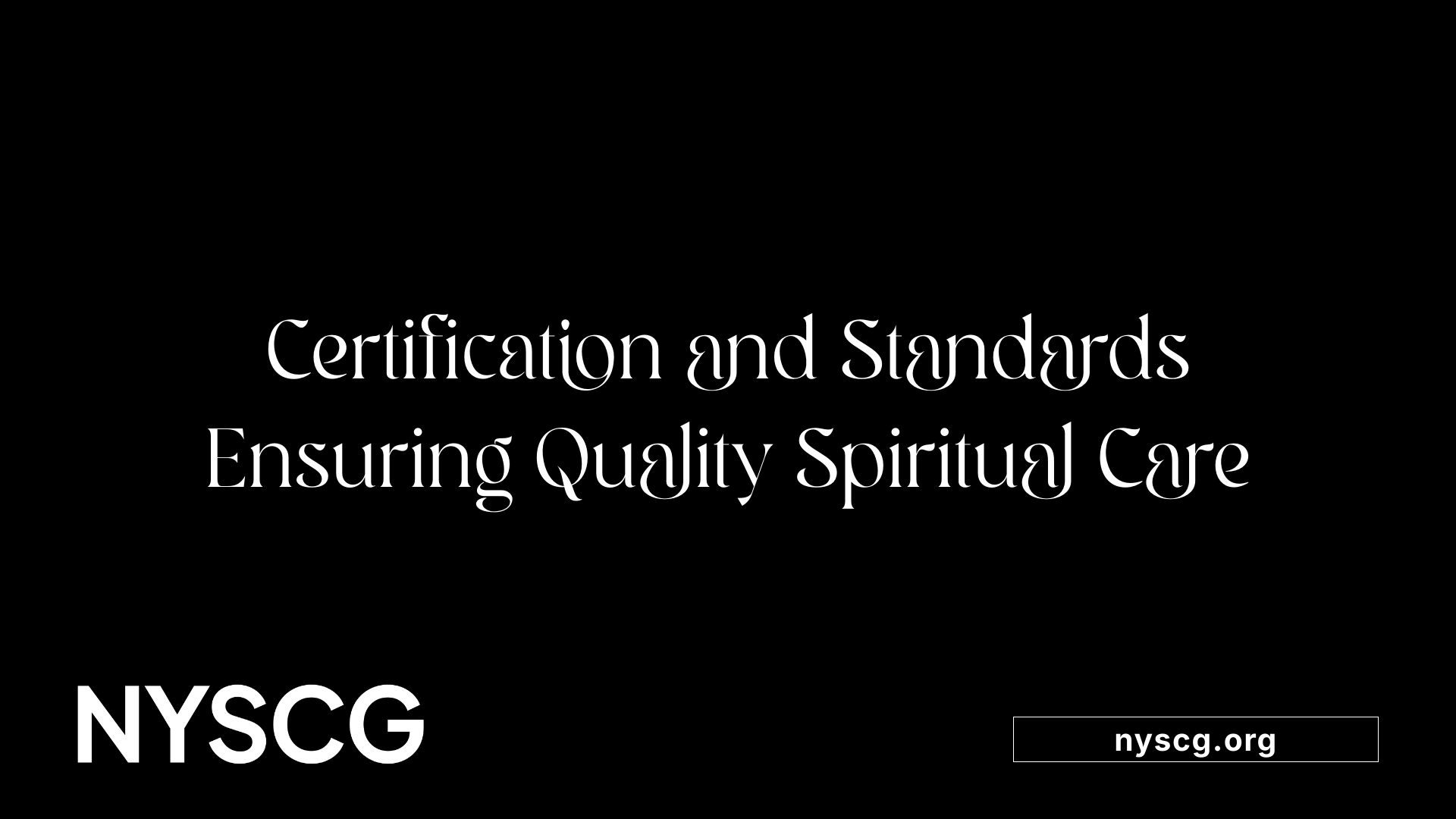
Most civilian employers and professional organizations require chaplains to obtain certification through recognized national bodies such as the Association of Professional Chaplains (APC), the National Association of Catholic Chaplains (NACC), or the Spiritual Care Association. These certifications verify that a chaplain has met rigorous educational, training, and ethical standards.
The process typically involves earning a graduate-level degree in fields like Theology, Divinity, Philosophy, or Psychology. Additionally, candidates must complete accredited Clinical Pastoral Education (CPE) units—usually at least four—that offer supervised, hands-on experience in spiritual care. This practical training helps develop skills in listening, counseling, and intercultural sensitivity.
Applicants are also required to accumulate a minimum of 2,000 hours of supervised work experience, which often includes placements in hospitals, military settings, or correctional facilities. Certification exams usually test knowledge of ethical standards, professional practices, and diverse religious traditions.
To qualify, candidates generally need an endorsement or affirmation from their religious faith group or denomination, confirming their suitability and endorsement to serve in institutional settings.
While certification is essential for many employment opportunities, licensing differs across regions. Most states or local jurisdictions do not require licensure for chaplains as mental health professionals do for psychologists or counselors. Instead, chaplains are credentialed based on certification standards, which uphold professionalism and ethical practice.
In comparison to other professions, licensing often involves state-based legal approval to practice, especially in fields like medicine or law. For chaplains, certification provides formal recognition of competence but does not typically confer legal licensing authority.
Overall, certification through known bodies ensures chaplains uphold consistent standards of professionalism, though it is not equivalent to state licensure. This distinction is important for understanding the scope of practice and accreditation in the field of spiritual care.
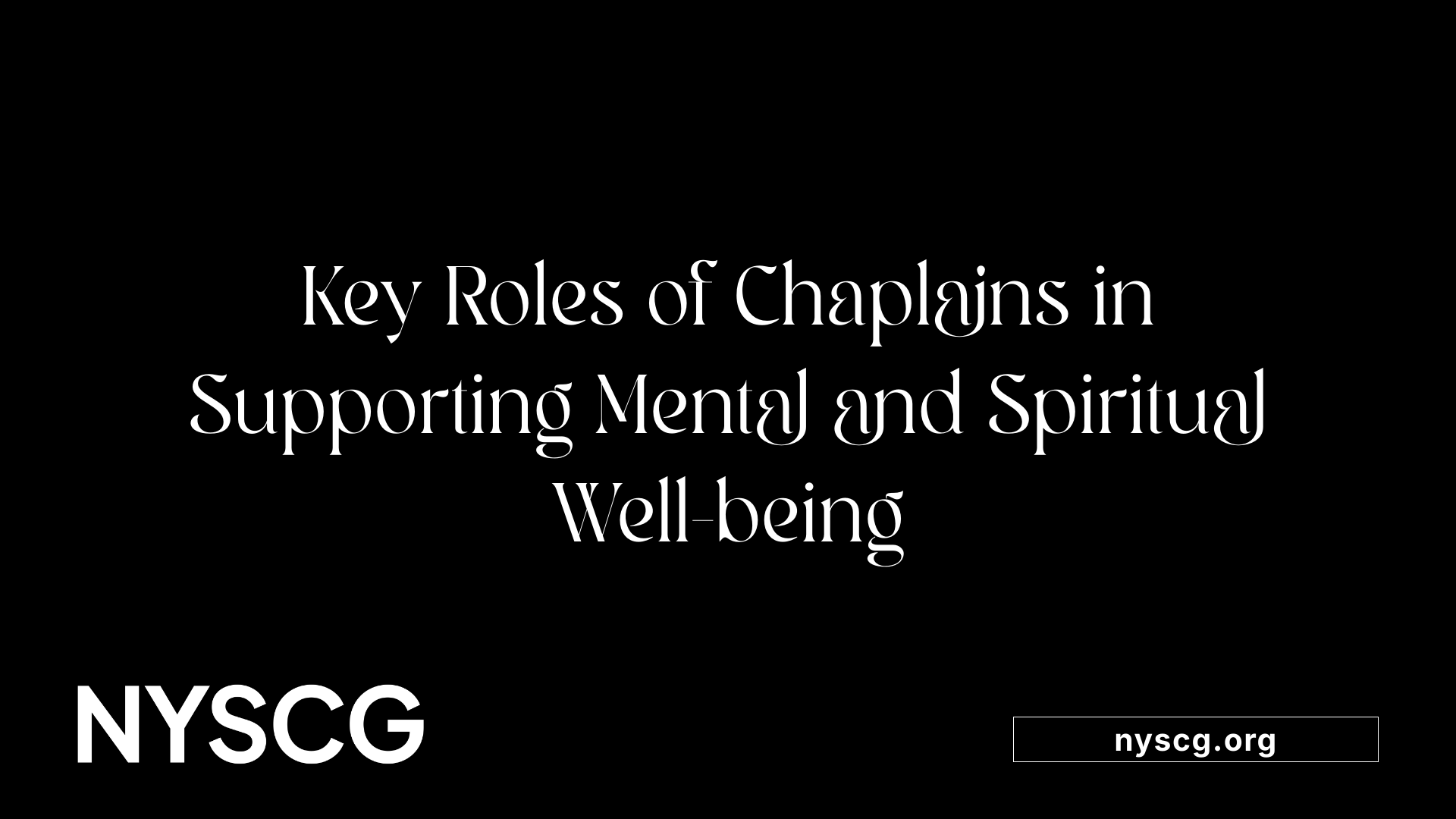
Chaplains play a vital role in providing spiritual and emotional support across various settings such as hospitals, prisons, military bases, and community organizations. Their core duties include offering comfort and guidance to individuals experiencing illness, grief, trauma, or life transitions.
A primary responsibility is leading religious services, ceremonies, and rituals—such as weddings, funerals, and prayer sessions—that cater to individuals from diverse religious backgrounds. Chaplains serve as compassionate listeners and confidants, helping people find meaning and hope during difficult times.
Additionally, they are involved in counseling and providing pastoral care tailored to each person's cultural and spiritual needs. This can include end-of-life support, bereavement counseling, or crisis intervention.
Chaplains often work closely with other professionals like healthcare providers, social workers, or legal personnel to coordinate holistic care. Their role includes advocating for spiritual well-being and ensuring that individuals' religious and emotional needs are addressed.
Overall, chaplains embody a supportive presence, offering comfort, hope, and moral guidance in moments of crisis or uncertainty, while respecting the beliefs and traditions of those they serve.
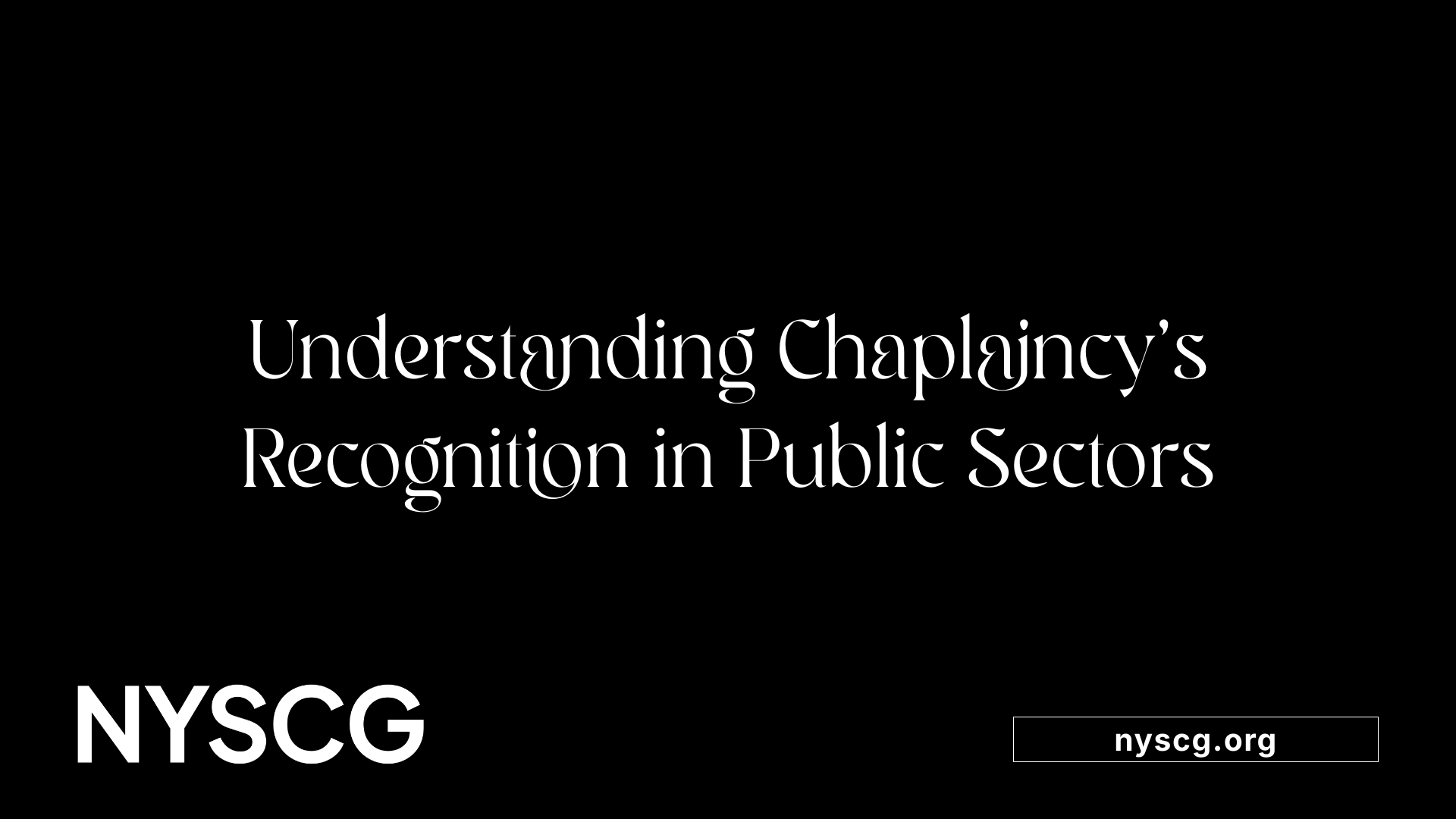
Chaplaincy is recognized and regulated as a professional service within various official and governmental frameworks. This categorization is especially evident in sectors such as healthcare, military, and correctional facilities, where chaplains serve in official capacities.
In the United States, several organizations oversee the certification and professional standards for chaplains. The National Association of Catholic Chaplains (NACC) and the Board for Certification of Chaplains Inc. (BCCI) are prominent certifying bodies. They establish rigorous standards through certification programs like the Board Certified Chaplain (BCC) and Associate Certified Chaplain (ACC), which include requirements such as academic degrees, supervised clinical pastoral education, and adherence to ethical guidelines.
Government agencies also acknowledge chaplaincy as an essential service. For instance, the California Department of Corrections and Rehabilitation (CDCR) officially lists chaplain positions, specifying necessary qualifications like endorsement by a faith group, completion of specialized training, and background checks.
This formal recognition is supported by licensing and accreditation systems that ensure chaplains are qualified to provide spiritual and emotional care. Certification processes often involve comprehensive education, practical clinical experience, and ongoing professional development.
Overall, chaplaincy's placement within official standards ensures that individuals serving as chaplains meet high competency levels, complying with organizational, legal, and safety regulations. This structured recognition helps maintain public trust and institutional integrity across various sectors, reaffirming chaplaincy as a vital, regulated component of institutional care.
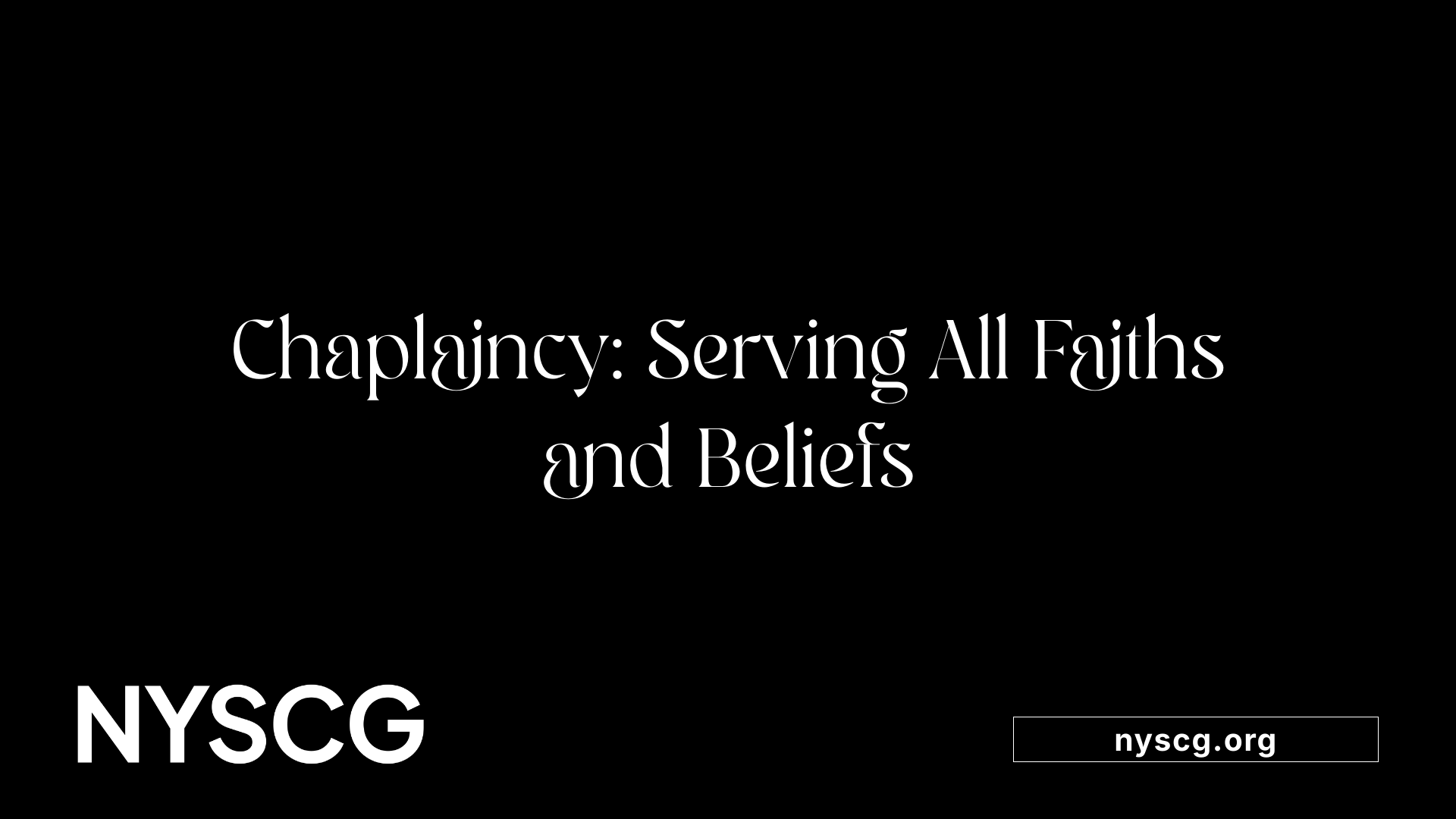
Chaplains are not tied exclusively to any specific faith tradition. Instead, they come from a wide range of religious backgrounds and are trained to serve both multi-faith and secular communities. Although many historically and currently have Christian (particularly Protestant) roots, there is a deliberate effort within the field to incorporate a variety of religious perspectives including Islam, Judaism, Catholicism, Buddhism, Hinduism, and others.
The primary focus of chaplains is to provide spiritual and emotional support that respects individuals' beliefs, whether religious, spiritual, or non-religious. For instance, military chaplains serve members of numerous faiths and belief systems, offering care tailored to each person’s worldview.
Chaplains prioritize presence, compassion, and support, fostering an environment where all individuals feel respected and cared for regardless of their religious affiliation or lack thereof. They often lead religious services, offer counseling, and conduct rites, but always with an emphasis on inclusivity and understanding.
Organizations supporting chaplaincy promote religious pluralism, encouraging practitioners to be adaptable and open. This approach ensures that people from different faiths or spiritual paths, or those without religious beliefs, receive respectful and meaningful support during challenging times.
| Aspect | Description | Additional Details |
|---|---|---|
| Multifaith services | Chaplains conduct religious services that cater to various faith groups or are open to all. | Designed to serve diverse populations in hospitals, military, prisons, and other institutional settings. |
| Religious diversity among practitioners | Chaplains represent a spectrum of religious traditions, reflecting the communities they serve. | Many organizations actively recruit chaplains from different faith backgrounds to ensure broad inclusivity. |
| Approach to serving beliefs | Emphasizes respect, neutrality, and presence, allowing individuals to express and explore their spirituality or beliefs freely. | Focuses on listening, support, and nonjudgmental care, regardless of the practitioner's own faith. |
Interested individuals can explore "Religious diversity and inclusivity in chaplaincy" to learn how the profession adapts to serve a pluralistic society effectively.
In conclusion, chaplaincy embodies a complex identity that seamlessly blends religious ministry with professional service. As societal awareness of diverse spiritual needs grows, the role of chaplains continues to evolve, emphasizing inclusivity, ethical standards, and specialized training. Recognized within official frameworks and supported by certification bodies, chaplaincy today is a respected and vital facet of institutional life, reflecting both a religious vocation and a professional discipline. Whether serving in hospitals, the military, prisons, or educational settings, chaplains stand as compassionate mediators, attuned to the spiritual and emotional landscapes of those they serve, asserting that chaplaincy remains both a ministry of faith and a recognized profession.
All you need is the will to make the world a better place.
New York State chaplain group inc. is a tax deductible organization with a federal tax Id number 92-383-4921